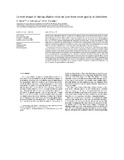| dc.description.abstract | Alkaline rocks (phosphate deposits in particular) of igneous origin are currently being mined in Zimbabwe.
Exploitation of these deposits, which are associated with metals and non-metals, provides a potential
for changing the river water quality in the surrounding areas by increasing metal and phosphates
levels in the water, thereby endangering the beneficial use of the river. The aim and objectives of this
paper are to enumerate the current impacts associated with mining alkaline rocks on Save River water
quality in Zimbabwe using the Dorowa mine as a case study. Though there are several impacts associated
with the mining of alkaline rocks, this paper deals only with impacts on water quality.
A preliminary assessment of the water quality in the Save River downstream of the Dorowa phosphate
mine showed an increase in conductivity, iron content, manganese content, nitrates and hardness when
compared to those taken before mining activity began. However, there was no notable increase in phosphate
and metals except for Fe and Mn. A plausible explanation for the low phosphate values in the water
is that the phosphates are precipitating and settling as sediments. Phosphate is known to effectively
remove metals from the surface water through the formation of metal–phosphate minerals. Thus, various
pollutants may be adsorbed into sediments accumulated on the bottom of the river. These sediments may
accumulate pollutants over long periods and act as new pollutant sources to the overlying water when
phosphate desorbs from sediments due to changes in water conditions. Therefore, the sediments can
act as a source of water pollution in the future | en_US |

